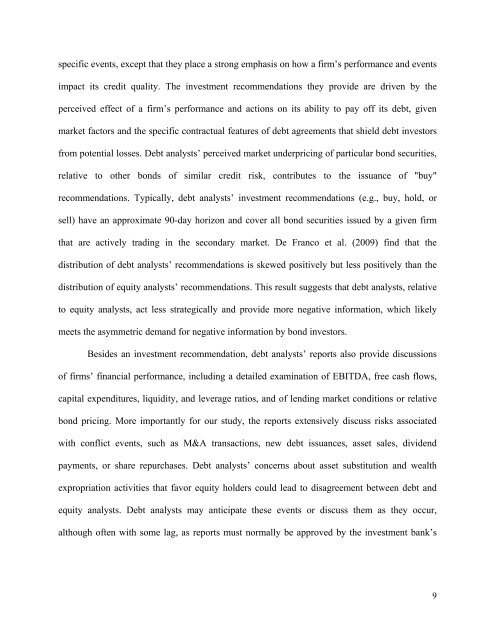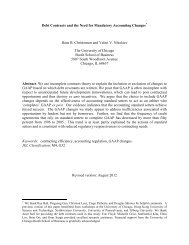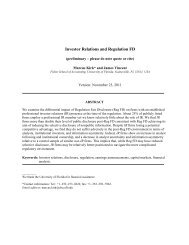Debt Analysts' Views of Debt-Equity Conflicts of Interest
Debt Analysts' Views of Debt-Equity Conflicts of Interest
Debt Analysts' Views of Debt-Equity Conflicts of Interest
Create successful ePaper yourself
Turn your PDF publications into a flip-book with our unique Google optimized e-Paper software.
specific events, except that they place a strong emphasis on how a firm’s performance and events<br />
impact its credit quality. The investment recommendations they provide are driven by the<br />
perceived effect <strong>of</strong> a firm’s performance and actions on its ability to pay <strong>of</strong>f its debt, given<br />
market factors and the specific contractual features <strong>of</strong> debt agreements that shield debt investors<br />
from potential losses. <strong>Debt</strong> analysts’ perceived market underpricing <strong>of</strong> particular bond securities,<br />
relative to other bonds <strong>of</strong> similar credit risk, contributes to the issuance <strong>of</strong> "buy"<br />
recommendations. Typically, debt analysts’ investment recommendations (e.g., buy, hold, or<br />
sell) have an approximate 90-day horizon and cover all bond securities issued by a given firm<br />
that are actively trading in the secondary market. De Franco et al. (2009) find that the<br />
distribution <strong>of</strong> debt analysts’ recommendations is skewed positively but less positively than the<br />
distribution <strong>of</strong> equity analysts’ recommendations. This result suggests that debt analysts, relative<br />
to equity analysts, act less strategically and provide more negative information, which likely<br />
meets the asymmetric demand for negative information by bond investors.<br />
Besides an investment recommendation, debt analysts’ reports also provide discussions<br />
<strong>of</strong> firms’ financial performance, including a detailed examination <strong>of</strong> EBITDA, free cash flows,<br />
capital expenditures, liquidity, and leverage ratios, and <strong>of</strong> lending market conditions or relative<br />
bond pricing. More importantly for our study, the reports extensively discuss risks associated<br />
with conflict events, such as M&A transactions, new debt issuances, asset sales, dividend<br />
payments, or share repurchases. <strong>Debt</strong> analysts’ concerns about asset substitution and wealth<br />
expropriation activities that favor equity holders could lead to disagreement between debt and<br />
equity analysts. <strong>Debt</strong> analysts may anticipate these events or discuss them as they occur,<br />
although <strong>of</strong>ten with some lag, as reports must normally be approved by the investment bank’s<br />
9
















